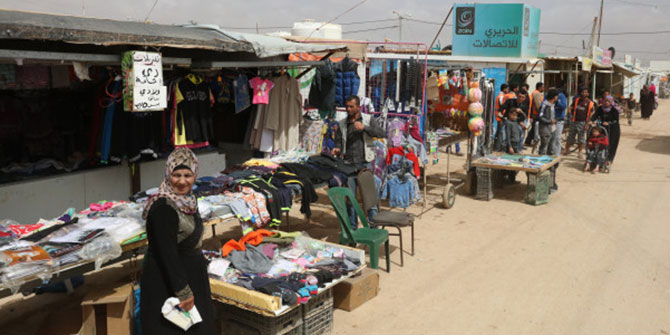To coincide with the upcoming day-long workshop on Industrialisation in Africa on May 3 2016, Laura Mann, from LSE’s International Development department offers her vision of what a more strategic approach to digital innovation might look like in African economies.
With the publication of UNECA’s excellent new report on Transformative Industrial Policy for Africa and with the release of some new critical books on ICTs and Economic Growth in Africa, now is a good time to take stock of past scholarship on ICTs and economic development in Africa and think more strategically about how African economies might capture more value from deepening their digital infrastructures.
First of all, we need to clearly distinguish between the consumption of ICTs by African consumers and the production of value through ICTs by African businesses. When people cite impressive rates of growth in ICT usage in African countries, that does not necessarily tell us much about where that economic value is being produced and captured, and by whom.

Second of all, too much research on the economic impacts of ICTs focuses on firm level improvements and efficiency gains: how individual businesses become more effective in their everyday activities. These kinds of improvements are helpful but researchers and policy-makers need to pay more attention to how ICTs are restructuring economies beyond the level of the firm. If we take the example of tourism, ICTs may allow individual African firms to better interact with tourists, but firms can also become more reliant on platforms controlled and run by foreign companies, which in turn can control prices and affect who becomes visible to foreign tourists. In agriculture, similar dynamics are being observed in terms of the control over traceability and other data systems. Look out for some of my publications with former colleagues at the Oxford Internet Institute as well as the recent book by Jim Murphy and Padraig Carmody on these kinds of dynamics (Padraig will also be speaking at workshop).
Third, currently there is a very strong neoliberal current circling questions of digital innovation in Africa but we should remember that the US government has one of the most active industrial policies in the world – chiefly in ICTs, pharmaceuticals, biotechnology and now green energy. Mariana Mazzucato, Fred Block and Linda Weiss have all written about the strong government support for the tech industry in the US, with innovations like the iPhone having benefited massively from early government investment. Shamel Azmeh from the LSE and Chris Foster, a former colleague at the Oxford Internet Institute (now at Sheffield) have also just published an LSE Working Paper on Digital Protectionism, stressing that the European Union and countries like China have tried to use data governance, data localisation and privacy laws as a way of boosting local tech companies and countering the domination by US firms but the US government has tried to fight back. In other words, most advanced economies engage in Industrial Policy! In Africa, big multinational technology companies have an incentive to promote a market-led vision of development and also to promote ICTs as developmental in order to gain non-profit support for their businesses. Yet recent reports by institutions like UNECA, UNCTAD and UNIDO suggest that African governments need to be extremely strategic in their dealings with foreign companies; to make sure those investments and activities contribute to raising the skill level in African countries, providing outsourcing and procurement opportunities for local businesses and paying taxes that can fund local R&D and training programmes. In other words, researchers and African policy-makers should think much more strategically about how African economies can capture value within their economies through the proliferation of ICTs and the deepening of the digital economy.
However, African governments also need to be very savvy about what kinds of support to give and whom to support as well. There is a tension between free and open competition to all and targeted support to companies that are best able to capitalise on that support and compete internationally in future. Here, an example from my own research in the Business Process Outsourcing (BPO) sector in Kenya is relevant. The Kenyan government tried to promote BPO by subsidising the cost of bandwidth to all BPO companies that wanted to try to engage in the sector. In the end, some inexperienced companies received that support, performed poorly and harmed the overall reputation of Kenyan firms in the eyes of international clients. In focus groups with BPO managers, they stressed the importance of some kind of vetting process – that a panel of public and private actors would agree on a set of standards and would vet new companies that wanted to work in the BPO sector. This organisation could help raise the level of local firms and also control the overall reputation of the country (I will be discussing this experience in closer detail in co-presentation with Jana Kleibert at the workshop). This is something that Robert Wade of LSE’s Department of International Development and John Sutton from the International Growth Centre based at LSE have also written about in relation to other sectors in other countries.
Of course, this gets into local politics – whether or not politically affiliated companies will end up controlling these opportunities – but this affects industrial policy everywhere in the world. Business is not always clean but that is the way economies grow! LSE’s Pritish Behuria has written some excellent pieces on the politics of business-state relations in Rwanda as has Hazel Gray on Tanzania (former LSE Fellow, now a Lecturer atof the University of Edinburgh. Both will also be presenting at the workshop on a panel on business-state relationships in economic development.
Fourth, we all know that using our mobiles, internet connections and smartcards generates massive amounts of transactional data (big data), which make economic systems much more traceable and also increases the potential for greater individualisation and segmentation in the economy. In the coming years, we are likely to see more targeted marketing, more targeted price discrimination and more targeted loans, insurance and social protection unveiled in African countries. This kind of data is likely to make African economies more ‘predictable’ thus easing the fears of foreign investors, but it is likely to create new winners and losers through segmentation. For example, data may tell us which farmers are the most productive, which consumers are the most credit-worthy and which parts of a country are most ripe for the expansion of super-markets. But what happens to people and places that are deemed unproductive and invaluable by for-profit tech companies and what happens to the informal systems currently servicing agricultural markets, financial needs and retail? This is an area that I am working on with Gianluca Iazzolino (also presenting!) and LSE Masters student, Hope Kyarisiima as well as colleagues in LSE’s Media and Communications department, such as Seeta Pena Gangadharan.
Fifth, digital data may change the overall framing of mobile apps in development. Seeta Pena Gangadharan, for example, researches how digital systems are increasingly being used to police the behaviour of those deemed deviant to society. In this way, while earlier discourse around ICTs stressed their potential for empowerment and emancipation through access to information and mobility, future mobile apps may become focused much more on controlling behavior and trying to introduce audit cultures within African societies and economies.
Lastly, digital data systems may increase the visibility of informal economic transactions and some have claimed this visibility will make broader based taxation possible. This development could contribute to domestic resource mobilisation (a very important part of any industrial policy plan). And in an ideal world, such visibility may result in better bargaining between tax payers and their governments. However much depends on how governments extract and spend the cash and as the LSE’s Kate Meagher has demonstrated, African informal economies are already taxed heavily through direct taxing by local authorities and indirect taxing by federal authorities. Using digital systems to increase their taxes further could risk undermining rather than improving revenue generation unless such policies are inflected with a clearer understanding of how informal economies engage with the state, discussed in her upcoming paper, ‘Taxing Times: Informal Economies, Taxation and Social Divisions in Nigeria‘ (under review).
If you are interested in these issues and want to come to the workshop on the 3 May, please get in touch with Shamel Azmeh at C.Azmeh@lse.ac.uk. There are still a few places free.
Dr Laura Mann is an Assistant Professor in LSE’s Department of International Development.
The views expressed in this post are those of the authors and in no way reflect those of the Africa at LSE blog or the London School of Economics and Political Science.






1 Comments